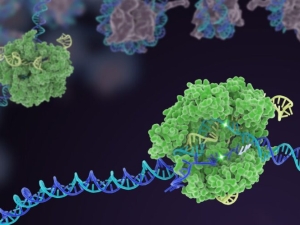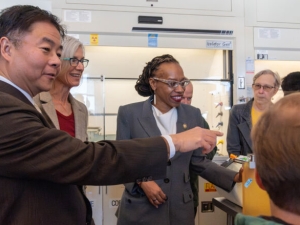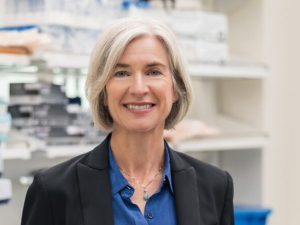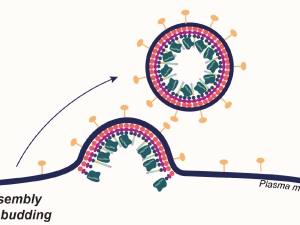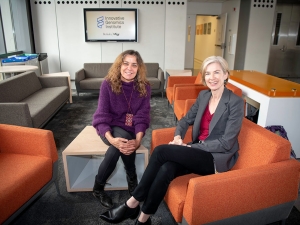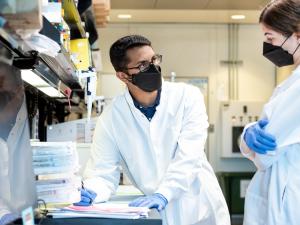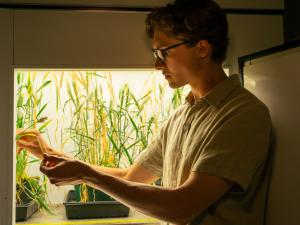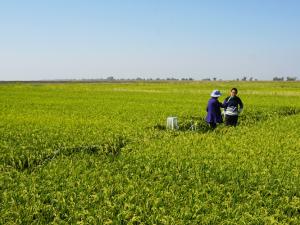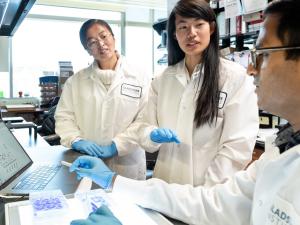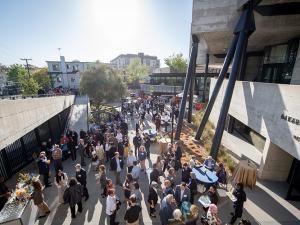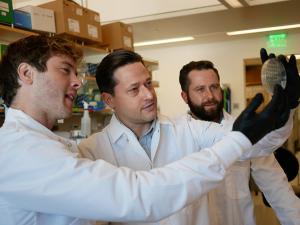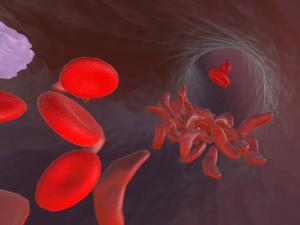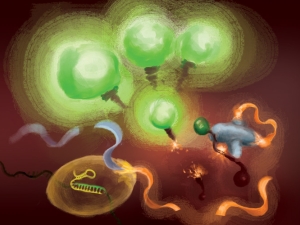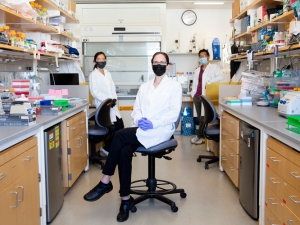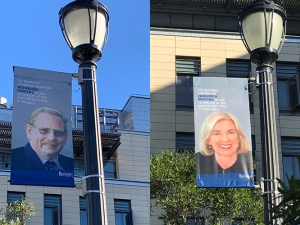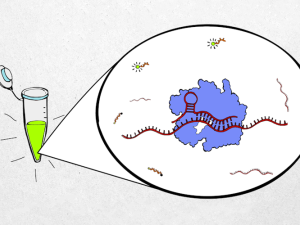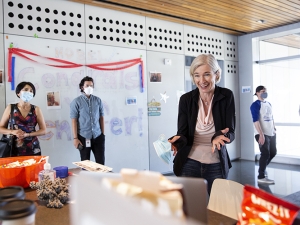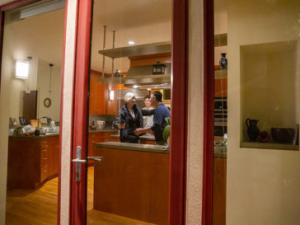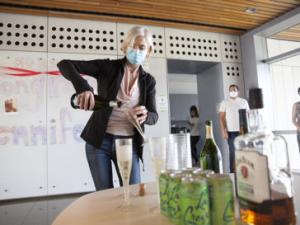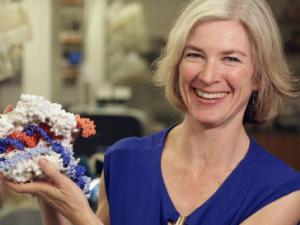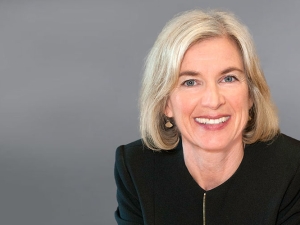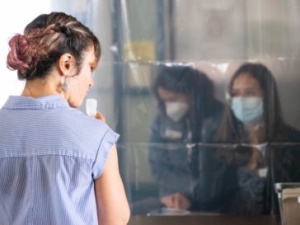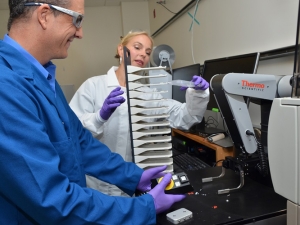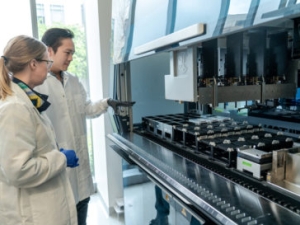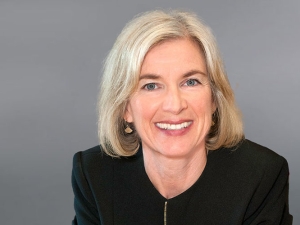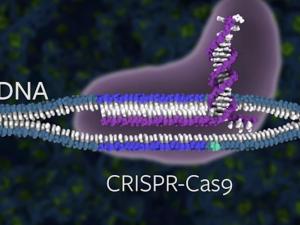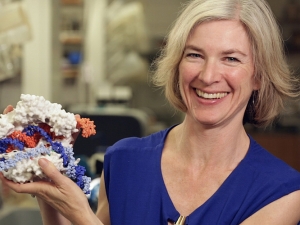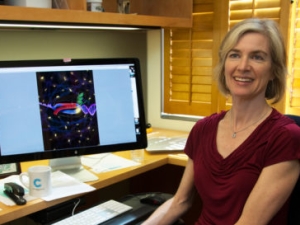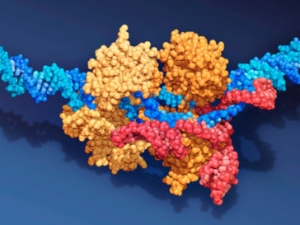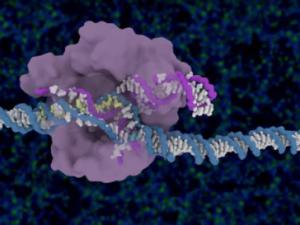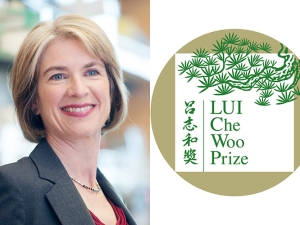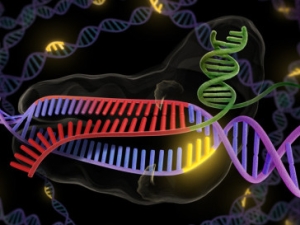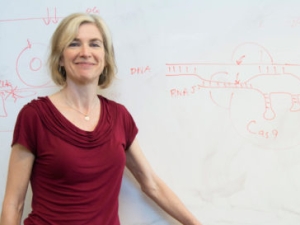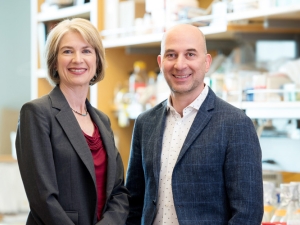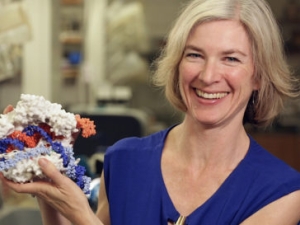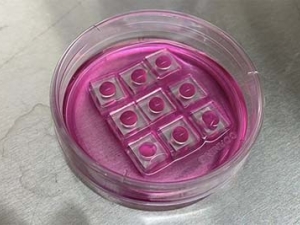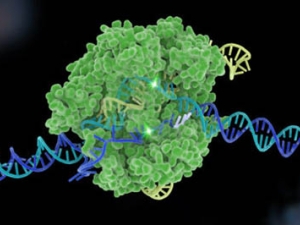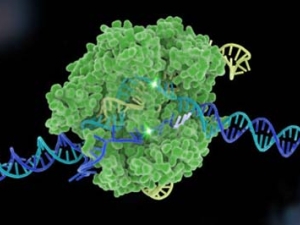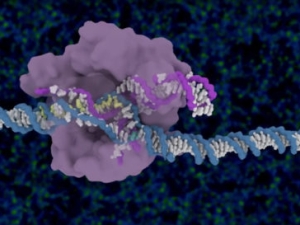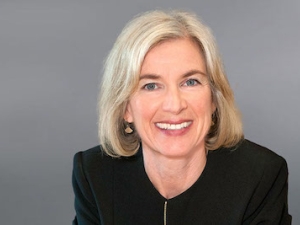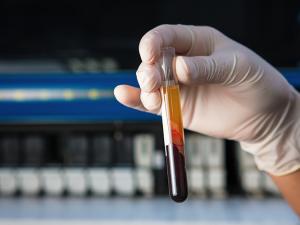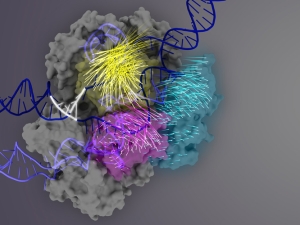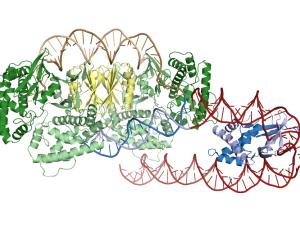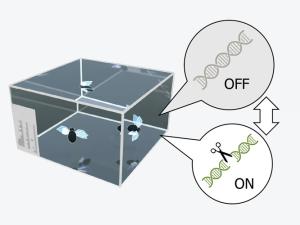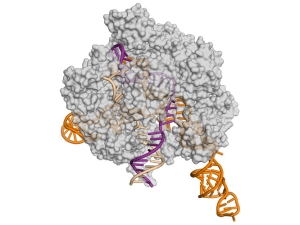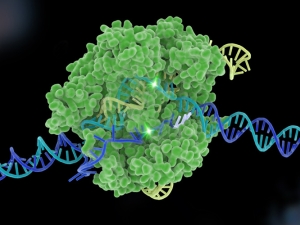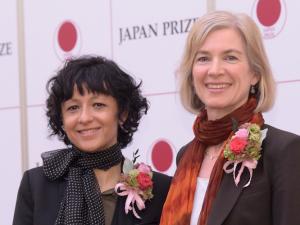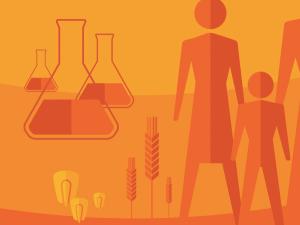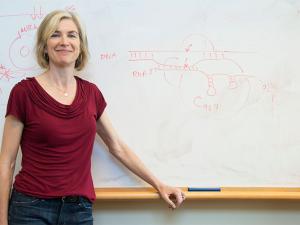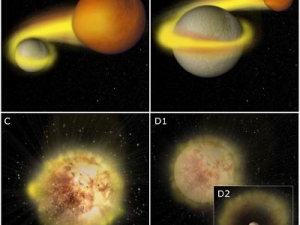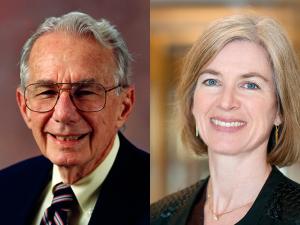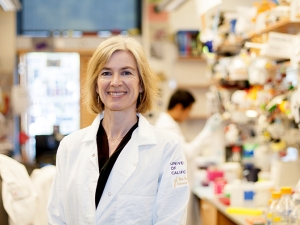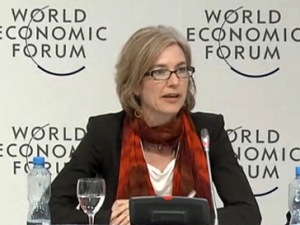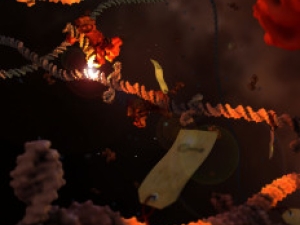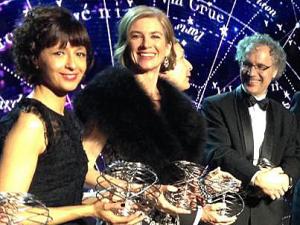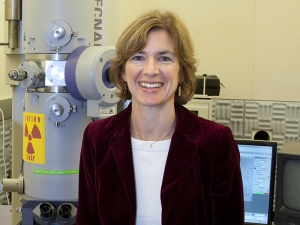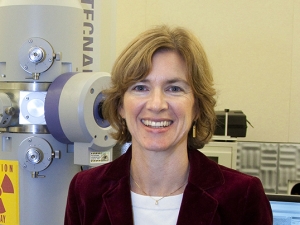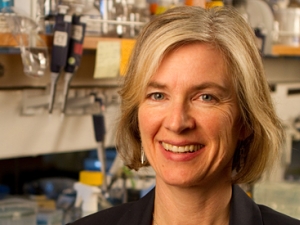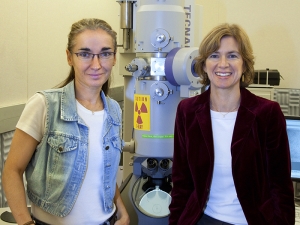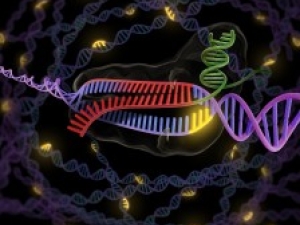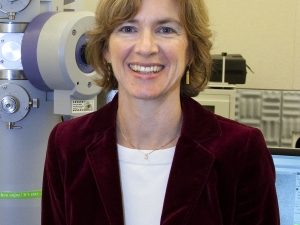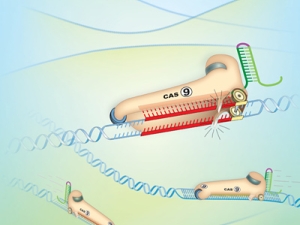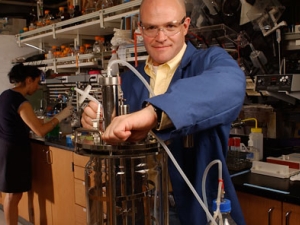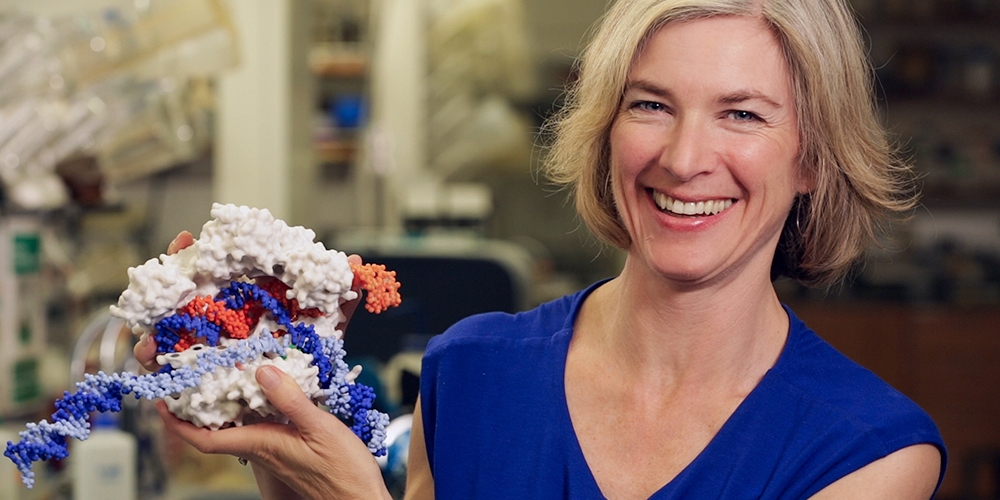

Research Bio
Jennifer Doudna is a Nobel Laureate in Chemistry, the Li Ka Shing Chancellor’s Chair in Biomedical and Health Sciences, and a Professor of Biochemistry, Biophysics and Structural Biology. Her research focuses on RNA as it forms a variety of complex globular structures, some of which function like enzymes or form functional complexes with proteins. Her lab's research into RNA biology led to the discovery of CRISPR-Cas9 as a tool for making targeted changes to the genome. In bacteria, CRISPR systems preserve invading genetic material and incorporate it into surveillance complexes to achieve adaptive immunity. Crystal structures of diverse Cas9 proteins reveal RNA-mediated conformational activation. Current research in the Doudna lab focuses on discovering and determining the mechanisms of novel CRISPR-Cas and associated proteins; developing genome editing tools for use in vitro, in plants, and in mammals; and developing anti-CRISPR agents. New discoveries in this field continue at a rapid pace, revealing a technology that has widespread applications in many areas of biology.
See also: https://innovativegenomics.org
Research Expertise and Interest
RNA machines, hepatitis C virus, RNA interference, ribosomes, x-ray crystallography, cryo-electron microscopy, CRISPR-Cas9 genome editing
In the News
Rewriting the code: The inside story of the first CRISPR cure
The Surprising Ecological Benefits of Cows
Nobel Laureate Jennifer Doudna on CRISPR and the Future of Gene Editing
CRISPR Researchers and Startup Entrepreneurs Will Share New Building in UC Berkeley’s Innovation Zone
Federal Appeals Court Sends CRISPR-Cas9 Patent Case Back To Patent Office for Reconsideration
U.S. Representatives Vow To Fight Freeze on Federal Research Funding
UC Berkeley’s Jennifer Doudna Receives National Medal of Technology and Innovation
Highly Targeted CRISPR Delivery Advances Gene Editing in Living Animals
A History of Innovation: Berkeley Entrepreneurs, Companies that Changed the Way We Live
IGI’s ‘Audacious’ New Frontier for CRISPR: Editing Microbiomes for Climate and Health
What Makes Omicron More Infectious Than Other COVID-19 Variants
In 10 years, CRISPR Transformed Medicine. Can It Now Help Us Deal With Climate Change?
Chan Zuckerberg Initiative Puts $11 Million Into Carbon Capture Research
Omicron Infection Leaves Unvaxxed With Little Protection Against Variant
Berkeley’s Bakar BioEnginuity Hub Opens Its Doors
CRISPRing the Microbiome is Just Around the Corner
$17 Million Will Launch Trial of CRISPR Cure for Sickle Cell Disease
Using two CRISPR enzymes, a COVID diagnostic in only 20 minutes
High-powered, but supportive, environment draws students to Nobel winners’ labs
Nobel Prize ceremonies go virtual for Doudna, Genzel
New CRISPR-based COVID-19 test uses smartphone cameras to spot virus RNA
UC Berkeley campus reacts to this week’s two Nobel Prize wins
First Day in a Nobel Life: Jennifer Doudna
Jill Banfield: How a curious Google search led me to Jennifer Doudna
What’s CRISPR? Jennifer Doudna and Radiolab can explain
UC Berkeley’s Jennifer Doudna wins 2020 Nobel Prize in Chemistry
UC Berkeley launches trial of saliva test for COVID-19
Scientists pivot to COVID-19 research, hoping for quick results to deal with pandemic
Campus lab takes COVID-19 testing to utility workers, underserved
UC Berkeley scientists spin up a robotic COVID-19 testing lab
Jennifer Doudna awarded 2020 Wolf Prize in Medicine
UC Rings Out 2019 With its 20th CRISPR Patent
UC now holds largest CRISPR-Cas9 patent portfolio
University of California awarded 15th U.S. CRISPR-Cas9 patent
CRISPR portfolio now at 14 and counting
UC receives its 11th U.S. patent for CRISPR-Cas9
Doudna awarded prize for helping build a better, more harmonious world
Newly granted CRISPR patents boost UC’s U.S. portfolio to 10
Eighth CRISPR patent issued by U.S.; seven more soon to come
GlaxoSmithKline taps UC’s CRISPR expertise to speed drug discovery
UC receives patent for use of CRISPR-Cas9 to tune gene expression
Introducing a kinder, gentler way to blow holes in cells
UC awarded third CRISPR patent, expanding its gene-editing portfolio
U.S. patent office indicates it will issue third CRISPR patent to UC
Patent awarded for DNA-targeting complex at heart of CRISPR-Cas9 gene editing
Doudna receives Medal of Honor from American Cancer Society
CRISPR scissors, Cas12a, enables cutting-edge diagnostics
Discovery helps engineer more accurate Cas9s for CRISPR editing
Researchers discover how CRISPR proteins find their target
Defense department pours $65 million into making CRISPR safer
Anti-CRISPR proteins decrease off-target side effects of CRISPR-Cas9
European Patent Office to grant UC a broad patent on CRISPR-Cas9
Doudna awarded Japan Prize for invention of CRISPR gene editing
CRISPR research institute expands into agriculture, microbiology
CRISPR toolbox expanded by protein that cuts RNA in two distinct ways
UC Berkeley to partner in $600M Chan Zuckerberg science ‘Biohub’
Taiwan’s Tang Prizes awarded to Doudna, Rosenfeld
Taiwan’s top science award, the Tang Prize, has gone to two UC Berkeley scientists well-known in the fields of biochemistry and physics: Jennifer Doudna, for her invention of CRISPR-Cas9 gene editing, and Arthur Rosenfeld, often called the “godfather of energy efficiency.”
Doudna named foreign member of UK’s Royal Society
Biochemist Jennifer Doudna has been named a foreign member of the prestigious Royal Society, a rare honor for a UC Berkeley faculty member.
Doudna joins Biden in Davos rollout of ‘cancer moonshot’
UC Berkeley biochemist Jennifer Doudna joined Joseph Biden this morning at the World Economic Forum in Davos, Switzerland, as the vice president promoted a major new U.S. initiative to speed the discovery of cures for cancer.
CRISPR-Cas9 gene editing: check three times, cut once
Two new studies from UC Berkeley should give scientists who use CRISPR-Cas9 for genome engineering greater confidence that they won’t inadvertently edit the wrong DNA.
Unlocking the Key to Immunological Memory in Bacteria
A powerful genome editing tool may soon become even more powerful. Researchers with the Lawrence Berkeley National Laboratory have unlocked the key to how bacteria are able to “steal” genetic information from viruses and other foreign invaders for use in their own immunological memory system.
Jennifer Doudna, Saul Perlmutter named 2015 Breakthrough Prize winners
Two UC Berkeley scientists — structural biologist Jennifer Doudna and physicist Saul Perlmutter — were named 2015 Breakthrough Prize winners in life sciences and physics, respectively, at a star-studded gala in Silicon Valley.
Jennifer Doudna featured on NPR's Morning Edition for her work on CRISPR/Cas9 — a tool for editing genes
Jennifer Doudna and her colleagues showed that CRISPR/Cas9, can be used with great precision to selectively disable or add several genes at once in human cells, offering a potent new tool to understand and treat complex genetic diseases.
Crispr Goes Global
Jennifer Doudna receives Lurie Award for gene editing breakthrough
Jennifer Doudna, professor of molecular and cell biology, is the 2014 recipient of the Lurie Prize in the Biomedical Sciences from the Foundation for the National Institutes of Health.
New insight into an emerging genome-editing tool
Biochemist Jennifer Doudna and biophysicist Eva Nogales led an international collaboration with results that point the way to the rational design of new and improved versions of Cas9 enzymes for basic research and genetic engineering.
Puzzling question in bacterial immune system answered
A team of researchers with the Berkeley Lab and UC Berkeley have determined how the bacterial enzyme known as Cas9, guided by RNA, is able to identify and degrade foreign DNA during viral infections, as well as induce site-specific genetic changes in animal and plant cells
Science magazine calls Berkeley discoveries top breakthroughs of 2013
Science magazine’s Breakthrough of the Year for 2013 – cancer immunotherapy – emerged from work conducted at UC Berkeley in the 1990s, while a 2012 UC Berkeley discovery was named one of nine runners up for the annual honor.
Biochemist Jennifer Doudna hailed for discovery of ‘holy grail’ of genetic engineering
Jennifer Doudna, Howard Hughes Investigator and Professor of Biochemistry, Biophysics and Structural Biology at UC Berkeley was recently featured in the Independent for her work on Crispr, which has taken the world of genetics by storm.
Cheap and easy technique to snip DNA could revolutionize gene therapy
A simple, precise and inexpensive method for cutting DNA to insert genes into human cells could transform genetic medicine, making routine what now are expensive, complicated and rare procedures for replacing defective genes in order to fix genetic disease or even cure AIDS.
Pilot program to bolster biophysical sciences’ innovation pipeline
The new Bakar Fellows Program is designed to help early-career Berkeley faculty commercialize promising research discoveries.
Doudna elected to Institute of Medicine
Jennifer Doudna has been elected a member of the Institute of Medicine, considered one of the highest honors in the fields of medicine and health. A professor of molecular and cell biology and an LBNL scientist, Doudna is one of only 12 IOM members on the UC Berkeley faculty.
Gates foundation awards $100,000 grants for novel global health research
Two UC Berkeley scientists, Jennifer Doudna and John Ngai, each will receive a $100,000 Grand Challenges Explorations grant from the Bill & Melinda Gates Foundation to explore innovative research that could impact global health.
Featured in the Media
“We have been moving in the direction of thinking about CRISPR as a platform for some years,” said Jennifer Doudna, a professor, Nobel laureate and founder of the Innovative Genomics Institute. The article also quotes Fyodor Urnov, a scientific director of the institute.
Jennifer Doudna, a professor of biochemistry, biophysics and structural biology, says there’s a 'coming revolution' in climate-adapted crops and animals.
Nobel laureate and Professor Jennifer Doudna will oversee the new center’s work alongside Fyodor Urnov, Doudna’s fellow Berkeley professor.
UC Berkeley biochemist Jennifer Doudna won the Nobel Prize in chemistry Wednesday for her work helping to develop a genome-editing tool, a breakthrough in biomedicine. Working with colleague Emmanuelle Charpentier, of the Max Planck Institute for Infection Biology in Berlin, Doudna developed CRISPR-Cas9, which allows scientists to edit DNA strands with previously unfathomable precision. For more on this, see our press release at Berkeley News. Stories on this topic have appeared in dozens of sources, including The Los Angeles Times, The Washington Post, AP News, Reuters, NPR, CNN, and The Mercury News.
Biochemist Jennifer Doudna and her colleagues rocked the research world in 2012 when they described a simple way of editing the DNA of any organism using an RNA-guided protein found in bacteria. Discovery of the CRISPR-Cas9 technology sharply accelerated work on human and nonhuman gene editing, helping researchers develop potential treatments for HIV, sickle-cell disease, and muscular dystrophy. Doudna, a professor at the University of California, Berkeley, and an investigator with the Howard Hughes Medical Institute, has become the public face of CRISPR and an advocate for robust public discussion of the ethical implications of gene editing. In November 2018 she visited the Science History Institute to give the annual Ullyot Public Affairs Lecture and receive the accompanying award. Before the talk Distillations writer Meir Rinde sat down with Doudna to find out what scientists can do with CRISPR, whether we should worry about designer embryos, and how to grow 500 tomatoes on a single plant.





